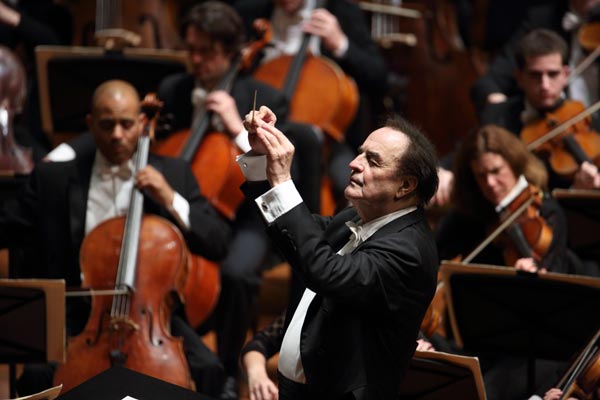

Sitting in the lobby of a five-star hotel in Wangfujing, the iconic pedestrian street in the capital, 65-year-old Lawrence Wolfe is watching the stream of cars on Chang'an Avenue flow past at 8:15 am beneath the early-morning sun. Like many foreign visitors in Beijing, Wolfe carries his camera and is ready to head to the Great Wall for a second time.
"I was 31 when I first came here. How time flies! I really enjoy the miraculous architecture. I miss it very much," he says.
However, what evokes Wolfe's memories about China is far more than the Great Wall. Thirty-five years ago, as a bassist with the Boston Symphony Orchestra, he came to perform in Beijing and Shanghai along with other musicians of the BSO.
The orchestra is now wrapping up its long-awaited return to China, performing in Beijing, Shanghai and Guangzhou on a tour ending May 6 at the Guangzhou Opera House, marking the orchestra's first performances in China since its historic March 1979 tour under the baton of Seiji Ozawa. It was the first symphony from the United States to visit China after the establishment of diplomatic relations earlier that year.
"I had no idea about China back then," recalls Wolfe, who returned with the orchestra. "The moment we touched down in Shanghai, which was our first stop, everything was so overwhelming, such as the sea of bicycles, the Mao uniforms and especially people's enthusiasm about Western music and musicians."
"Because I am tall and look American, people were curious about me. I remember the burning coals and the chimneys outside the houses. I wanted to go to the old neighborhoods this time to see if they are still there," he adds.
Three weeks before Wolfe came to China in 1979, his twin daughters were born. It was heartbreaking for him to leave.
He remembers one day that he walked on the street with an interpreter, and he stopped to show him pictures of his daughters.
"Soon, people on the street surrounded us, curious about what we were looking at," he says. "But it won't happen again now. China has attracted many foreign people, and there is no language barrier since many Chinese can speak English."
The 1979 trip to China planted many seeds: Wolfe exchanged tapes with professors at local conservatories in master classes and workshops. During this trip, he will have dinner with the parents of his two Chinese students, who are pursuing their bass studies in the United States.
"Things are so merged between China and the Western countries. For those young Chinese talents, nationality is not a problem. When Lang Lang sits behind the piano, I just hear music, rather than where he comes from," Wolfe says.
According to BSO managing director Mark Volpe, after that first historic trip, the orchestra had planned to return to China in 1999. But the NATO bombing of China's embassy in Belgrade led the orchestra to cancel the tour at the last minute. Despite that, the BSO's 13th music director, Seiji Ozawa, who was born in China, came to China to teach at Beijing's Central Conservatory of Music, where he found the level of performance to be very high and said he appreciated the many sentiments of regret expressed about the tour's cancellation.
This time, the BSO was approached by conductor Lorin Maazel, who had been particularly looking forward to this tour to celebrate more than 50 years with the orchestra. However, due to an accident, doctors advised Maazel not to make the trip. Swiss conductor Charles Dutoit stepped in to lead the tour, which includes Mahlerls Symphony No 5, Tchaikovsky's Symphony No 5, and Mozart's Symphony No 38 (Prague Symphony). The program also includes one of the Boston symphony's signature works, Berlioz's Fantastic Symphony.
Copyright ©1999-2018
Chinanews.com. All rights reserved.
Reproduction in whole or in part without permission is prohibited.